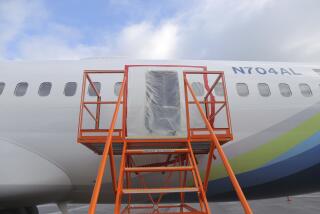Ex-Inspectors on Alaska Pipeline Warn of Dangers : Safety: They tell Congress the project’s builder blacklisted workers who spoke up about hazards.
- Share via
WASHINGTON — Four former inspectors on the trans-Alaska pipeline told Congress on Wednesday that the massive oil-transit system suffers from dangerous safety defects that could result in deadly accidents and potentially fatal explosions.
Management ignores warnings and fires inspectors who try to enforce safety rules, the inspectors testified. One former inspector and another still on the payroll of the Alyeska Pipeline Service Co. said the pipeline operator kept “blacklists” of temporary inspectors who complained about corrosion and other safety problems, to make sure they were never hired again.
“If you wanted to get on the management team, you shut your mouth and turned your head,” Richard Green, who was fired by Alyeska, told the House Energy and Commerce oversight subcommittee.
Green said aging equipment, loading systems and wiring at Alyeska’s tanker terminal in Valdez could prompt “an explosion that could blow a tanker out of the water.” That could cause deaths as well as damage 20 times greater than the massive 1989 oil spill from the grounded tanker Exxon Valdez.
Alyeska’s new president, David J. Pritchard, promised a cleanup at the company, pledging to the committee that “these problems will be fixed--both the physical problems and the systemic management problems.”
The major partners in Alyeska are British Petroleum Co. and Los Angeles-based Atlantic Richfield Corp.
The 800-mile trans-Alaska pipeline carries oil from Alaska’s prolific North Slope fields to the port of Valdez. The pipeline carries more than 1.5 million barrels of oil daily--about 25% of the U.S. petroleum output.
Alyeska has drawn steady criticism from environmentalists, state and federal regulators and congressional overseers for its safety and environmental records--criticism that reached a fever pitch after the Exxon Valdez disaster.
R. Glen Plumlee, a former inspector who said he refused to maintain a blacklist, told the subcommittee, “The situation on the pipeline is critical and requires urgent attention.”
The pipeline management’s “failure to inspect and then to correct problems according to sound, written procedures means the danger of a massive breakdown in the pipeline is not only great but imminent,” Plumlee said. “Alyeska cannot be trusted to correct this pattern of dangerous and intentional neglect on its own. That’s why I’m here.”
Chuck Biddy, a quality control inspector still working for Alyeska, said the Valdez shipping terminal manager warned him that “he would break my goddamn arm” if Biddy submitted another critical inspection report.
Biddy said he believed there were several blacklists maintained of inspectors who had warned about safety problems. In 1991, he said, an Alyeska executive “showed me a copy of a blacklist three pages long of people not eligible for rehire.” Many inspectors work for the pipeline on temporary contracts.
Pritchard said the manager who threatened to harm Biddy is still working for Alyeska at the Valdez terminal, “but he is no longer in the kind of assignment where he has to deal with inspectors.”
He said Alyeska will spend at least $10 million to fix 1,000 violations of electrical codes at the terminal. “I want us to get where we can uncover these things ourselves and not rely on the (congressional) committee and the investigators,” he said.
Rep. George Miller (D-Martinez), chairman of the House Natural Resources Committee, was sharply critical of the company. “People who work in this country should not be harassed, intimidated and punished for trying to do their jobs well and comply with the law,” said Miller, who has directed an investigation of Alyeska.
The Labor Department has ruled that Green was wrongfully fired, ordering him reinstated with back pay.
Inspectors James Schooley and Plumlee also filed complaints with the Labor Department; their cases were eventually settled.
Former inspector Joe Tracanna, who said he was forced to resign, testified that he had uncovered problems in Alyeska’s electrical system that could result in “fires, explosions and massive discharge of oil and other pollutants into Valdez Harbor.”
The company’s response, he said, “was to transfer me to a make-work position where I could no longer perform inspections and eventually to blacklist me so that I cannot find similar work in the region.”
Subcommittee Chairman Rep. John Dingell (D-Mich.), who led the hearing, said, “It is past time for the owners of the pipeline to commit to openness and to accountability for pipeline operations.”
More to Read
Sign up for Essential California
The most important California stories and recommendations in your inbox every morning.
You may occasionally receive promotional content from the Los Angeles Times.










